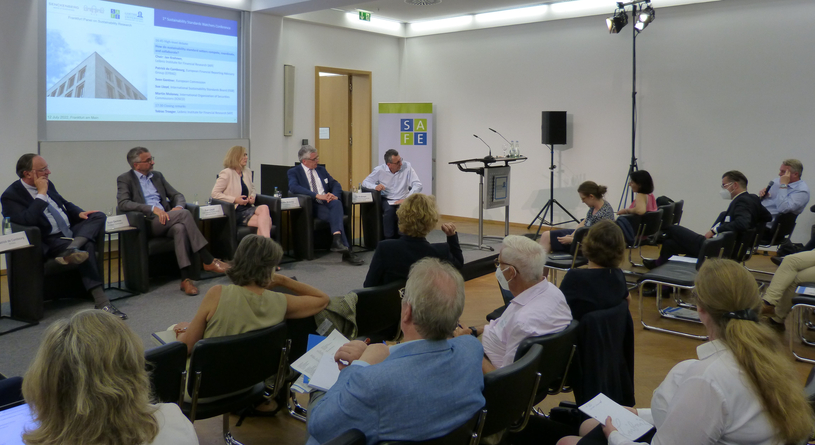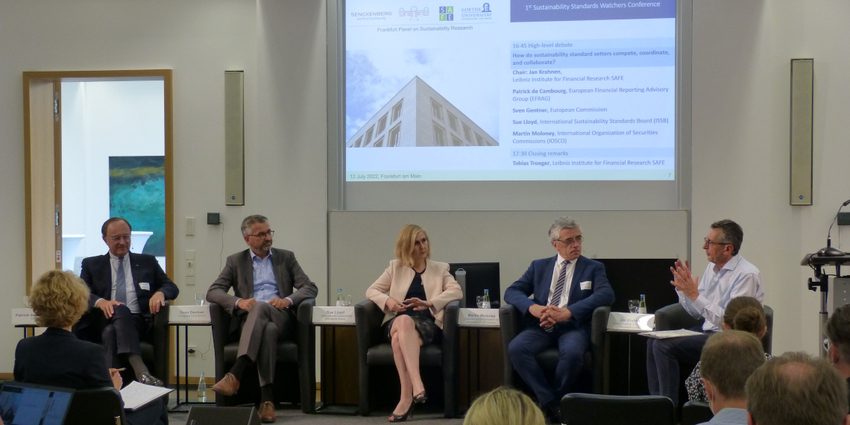The consequences of climate change also threaten financial stability. Globally consistent sustainability reporting by companies is essential to enable sustainable investment decisions. At the first Sustainability Standards Watchers Conference on 12 July at the House of Finance in Frankfurt, academics and practitioners discussed how to make the impacts of climate change measurable so that data and metrics can be delivered and used globally to define binding sustainability standards.
The event was organized by the Frankfurt Panel on Sustainability Research (FPSR), a newly founded association of researchers from the Leibniz Institute for Financial Market Research SAFE, the Goethe University Frankfurt, the Senckenberg Biodiversity and Climate Research Center (SBiK-F), and the Potsdam Institute for Climate Impact Research (PIK). Designed as a platform for a science-based critical assessment and evaluation of sustainability standards, the conference mobilized key stakeholders for the first time to address concrete issues.
A day of discussions brought together international finance scholars, climate and ecosystem scientists, lawyers, and representatives from central banks, institutions, and the financial industry. In his conference keynote address, Robert Stambaugh, Professor of Finance at the Wharton School of the University of Pennsylvania, presented research on trends in expected and actual realized returns on green assets over the past decade. In combination with the panel discussion, it was clear that in addition to scientific expertise, an enormous effort from policymakers, regulators, and stakeholders is needed as time is of the essence. Contrary to the previous rules of the game, several different standard-setting processes now need to be handled quickly at the same time, some of which have yet to be set and coordinated between areas of responsibility.
Currently, competing institutions must coordinate and cooperate in setting sustainability standards. Much like climate change is leading to previously unobserved phenomena, gathering, documenting, and reporting information for binding sustainability standards is an emerging discipline, as Patrick de Cambourg pointed out during the high-level debate moderated by SAFE Director Jan Pieter Krahnen. Cambourg, representing the European Financial Reporting Advisory Group (EFRAG), which provides technical expertise to the EU Commission in the process of adopting International Financial Reporting Standards (IFRS), shared the panel with Sven Gentner of the EU Commission, Sue Lloyd of the International Sustainability Standards Board (ISSB), and Martin Moloney, Secretary General of the International Organization of Securities Commissions (IOSCO).
“We have to gain traction”
Cambourg, referring to the analysis of climate impacts, noted that while some of the financial consequences, for instance in corporate cash flows, could not yet be quantified, that could change quickly: “We have a time constraint, and we have to gain traction.” He welcomed the ISSB approach as presented by Sue Lloyd at the conference, but made clear that on a global scale, not all regions had such institutional advantages as the EU to match the ISSB approach. Dialogue is at the heart of interoperability and the key to successful collaboration among all the actors involved, he said.
“By this interoperability, we mean globally compatible information on sustainability for investors in line with legal requirements,” Lloyd said in direct reference to the EFRAG board member’s remarks. The goal of the ISSB, she continued, is to enable investors in the capital markets to make comparable decisions with the best possible transparency of the specified disclosure obligations. As these obligations are country-specific, the ISSB intends to implement a building block approach by the end of the year. According to this approach, the utmost priority will be to report on all sustainability aspects that have a significant positive or negative impact on people, the environment, and the economy. This would then be built upon by reporting on those sustainability-related issues that can increase or decrease enterprise value in the short, medium, and long term, as well as related disclosures in companies' annual reports. “Our focus is on investors, for whom this information would not be visible without the ISSB,” said Sue Lloyd.

IOSCO Secretary General Martin Moloney explained that a data-driven approach is needed to define and then possibly set sustainability standards. What is needed now, he said, is to establish globally integrated data management to reconcile standard-setting and regulatory processes. Key metrics are the criteria of success in this regard, he said, and jurisdictions can enforce them. “We are moving from what has been voluntarily standard setting to public policy mandatory standard setting,” Moloney continued, “that has never been done before.” Until now, he said, the momentum has always been with legislation, which has set standards through more or less regulation, which companies have then adopted. That is now changing in the wake of climate change, he said.
Sven Gentner, Head of Unit for Corporate reporting, audit, and credit rating agencies in the EU Commission’s Directorate General for Financial Stability, Financial Services, and Capital Markets Union, highlighted the complexities of the implementation process – and stressed that the EU Commission, as an authority, covers a much broader scope due to the diversity of stakeholders involved in standard setting compared to the ISSB. “We have to make sure that companies don’t have to report on different types of standards,” Gentner said, meaning that it is important to avoid redundant reporting by companies. In the European legislative process, he said, a balance must be found between different legal frameworks. Only this balance makes it possible to define binding targets for regulators and companies. Based on these objectives, investors, stakeholders, and financial market participants alike would then be provided with reliable information so that they could make their decisions. “We are under enormous time pressure,” Gentner said, “because we must solve this problem at a high pace, and we need to work in parallel in different approaches policy-wise.”
Policy Center Contact


